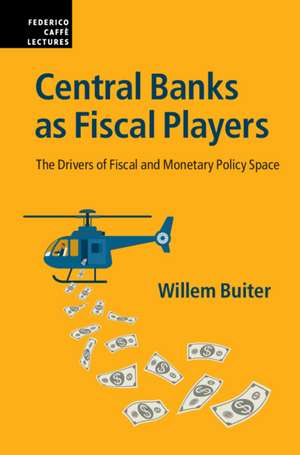Central Banks as Fiscal Players: The Drivers of Fiscal and Monetary Policy Space: Federico Caffè Lectures
Autor Willem Buiteren Limba Engleză Paperback – 11 noi 2020
| Toate formatele și edițiile | Preț | Express |
|---|---|---|
| Paperback (1) | 281.67 lei 6-8 săpt. | |
| Cambridge University Press – 11 noi 2020 | 281.67 lei 6-8 săpt. | |
| Hardback (1) | 497.12 lei 6-8 săpt. | |
| Cambridge University Press – 11 noi 2020 | 497.12 lei 6-8 săpt. |
Din seria Federico Caffè Lectures
-
 Preț: 236.16 lei
Preț: 236.16 lei -
 Preț: 289.10 lei
Preț: 289.10 lei -
 Preț: 280.91 lei
Preț: 280.91 lei - 11%
 Preț: 462.32 lei
Preț: 462.32 lei -
 Preț: 405.10 lei
Preț: 405.10 lei -
 Preț: 243.29 lei
Preț: 243.29 lei -
 Preț: 366.03 lei
Preț: 366.03 lei -
 Preț: 366.03 lei
Preț: 366.03 lei -
 Preț: 231.98 lei
Preț: 231.98 lei -
 Preț: 323.86 lei
Preț: 323.86 lei
Preț: 281.67 lei
Nou
Puncte Express: 423
Preț estimativ în valută:
53.90€ • 56.27$ • 44.61£
53.90€ • 56.27$ • 44.61£
Carte tipărită la comandă
Livrare economică 05-19 aprilie
Preluare comenzi: 021 569.72.76
Specificații
ISBN-13: 9781108822763
ISBN-10: 1108822762
Pagini: 200
Dimensiuni: 230 x 150 x 10 mm
Greutate: 0.31 kg
Editura: Cambridge University Press
Colecția Cambridge University Press
Seria Federico Caffè Lectures
Locul publicării:Cambridge, United Kingdom
ISBN-10: 1108822762
Pagini: 200
Dimensiuni: 230 x 150 x 10 mm
Greutate: 0.31 kg
Editura: Cambridge University Press
Colecția Cambridge University Press
Seria Federico Caffè Lectures
Locul publicării:Cambridge, United Kingdom
Cuprins
Introduction; 1. The central bank balance sheet: why it matters; Appendix to chapter 1: stochastic discount factors; 2. A stylized set of accounts for the Treasury, the central bank and the State; 3. Helicopter money drops; 4. The fallacy of the fiscal theory of the price level – and why it matters; Appendix to chapter 4: a formal approach to the FTPL; 5. Life at the zero lower bound and how to escape from it; 6. Why the Eurosystem isn't a proper central bank – and how to make it one.
Recenzii
'This book is the culmination of a long series of prior studies by the author into the proper accounting for a Central Bank within the balance sheet of the State, made particularly interesting by the fact that its liabilities are nowadays, usually, irredeemable. Willem Buiter rigorously examines important subjects such as how Central Bank operations add fiscal space to the Treasury; how helicopter money drops will always be expansionary; why the fiscal theory of the price level is just wrong, how deeply negative nominal interest rates can be implemented and why National Central Banks within the Euro-area are unusually exposed to risk.' Charles Goodhart, London School of Economics
'An important book by one of the deepest and most original thinkers in the field of modern central banking. Today, more than ever, the fiscal side of central banks has taken increasing precedence over traditional interest rate policy. Yet, frighteningly few scholars and policymakers truly understand the connections. Buiter's clear-headed focus on intergovernmental and intertemporal budget constraints will give readers a far better understanding. It might even catalyze a much-needed rethink of monetary and fiscal policy at the zero bound.' Kenneth Rogoff, Harvard University
'Willem Buiter is the acknowledged master of the public sector accounts. In this timely little volume, he exposes the intimate connection between the central bank and the fiscal authorities, delivering a series of provocative insights regarding the scope for monetary finance, the efficacy of 'helicopter money', the validity of the 'fiscal theory of the price level', the elimination of the interest-rate lower bound, and the flaws in the architecture of the European Monetary Union.' Charles Bean, London School of Economics
'Recommended.' M. H. Lesser, Choice Magazine
'An important book by one of the deepest and most original thinkers in the field of modern central banking. Today, more than ever, the fiscal side of central banks has taken increasing precedence over traditional interest rate policy. Yet, frighteningly few scholars and policymakers truly understand the connections. Buiter's clear-headed focus on intergovernmental and intertemporal budget constraints will give readers a far better understanding. It might even catalyze a much-needed rethink of monetary and fiscal policy at the zero bound.' Kenneth Rogoff, Harvard University
'Willem Buiter is the acknowledged master of the public sector accounts. In this timely little volume, he exposes the intimate connection between the central bank and the fiscal authorities, delivering a series of provocative insights regarding the scope for monetary finance, the efficacy of 'helicopter money', the validity of the 'fiscal theory of the price level', the elimination of the interest-rate lower bound, and the flaws in the architecture of the European Monetary Union.' Charles Bean, London School of Economics
'Recommended.' M. H. Lesser, Choice Magazine
Notă biografică
Descriere
This book develops a unified framework to address a number of key issues in monetary economics and public finance.
